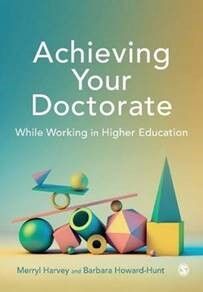Completing your doctorate is hard enough without the added pressures of working in higher education. Below, Dr Barbara Howard-Hunt and Professor Merryl Harvey discuss what it’s like to balance both and explores how their recent book aims to help those who are working towards their doctorate.
Undertaking a doctorate whilst also working as an academic in higher education presents unique challenges. These are further compounded if the doctorate is being undertaken in the academic’s ‘home’ institution.
Our book, ‘Achieving Your Doctorate While Employed in Higher Education’, is unusual in that it does not take a traditional approach to writing about attaining a doctorate. Its intention is not to provide guidance on issues such as choosing an appropriate research topic, methodological approach or the intricacies of data collection and analysis. These aspects of doctoral work are all, of course, covered extensively in other publications. Instead, this book is written exclusively from the perspective of those academics who are already established in their academic careers and are considering undertaking doctoral study.
Doctoral students working in academia – what’s the difference?
We have long recognised that the experiences of part-time post-graduate students, who have an existing academic career with a full workload, are fundamentally different from other groups of doctoral students.
In the United Kingdom, most of this group are employed within post-1992 universities, which, prior to gaining university status were polytechnic institutions. These institutions had a strong commitment to teaching and learning pedagogy and professional practice programmes, rather than research. However, many of the academics employed at these newer higher education institutions are now seeking to obtain a doctorate, in recognition of their experience and professional development in teaching and learning or because obtaining a doctorate is a requirement for promotion.
The importance of support networks
This book draws on our personal experiences of being doctoral students and of supervising academics undertaking their doctorate. The impetus for this book arose out of many discussions with colleagues during a monthly doctoral forum at our university.
This forum was developed for staff who are already undertaking doctoral study in-house or elsewhere, or who were considering doing so. The forum was open exclusively for staff as it is acknowledged that other groups of doctoral students, often had naturally formed networks of supports, such as breakfast journal clubs and seminars, which they can access to meet with their peers for mutual support.
We know that these types of peer support groups can be immensely helpful to postgraduate researchers as they share research ides, discuss research questions and give and receive feedback on each other’s work. The sharing of ideas and knowledge, about procedures, systems and policies can also be crucial to postgraduate researchers, who for the majority of the time are working in isolation and may feel marginalised. Such forums are also crucial in providing opportunities for exploratory talk, which is essential to the development of ideas. They also facilitate postgraduate students in keeping in touch with each other, thereby providing emotional as well as practical support, outside of the formal supervisory team.
These events, however, are often taking place at the same time as teaching and other work. This means that academic staff, who also are studying for their doctorates, are often unable to attend due to the requirements of their jobs. The burden of work means that even when activities are arranged outside ‘teaching’ time, it can be difficult for them to attend. It became clear that this group of postgraduate researchers needed a safe, non-judgemental environment where everything ‘doctoral’ was open for discussion.
Addressing the anxieties of doctoral study
In this book, we address the challenges, tensions and messiness that doing a doctorate in your home institution can present. Topics covered within the book include imposter syndrome and insecurities about academic abilities, with the accompanying feelings of guilt and shame at being exposed as lacking.
We also acknowledge the potential rivalry amongst peers, who may feel that it is unfair that their colleagues undertaking doctoral study may be granted protected study time, leaving them to get on with the ‘real’ work. We explore issues around time pressure, specifically when the needs of the department are in conflict with that of the post-graduate research student, who may find their study time cancelled to cover teaching or other seemingly higher priority work.
We also highlight challenges in relation to hierarchy and power, which can be especially troublesome when the supervisory team are also colleagues, some of whom may be junior to those they are supervising. We do not simply focus on the challenges of being both student and teacher but offer problem-solving strategies and options to navigate these challenges.
A guide for your journey
If you think of doctoral study as a journey, then this book is presented as a guide, helping you to forward plan, to pre-empt and minimise the difficulties that may be encountered on route.
We aim to tell it warts and all and we do not shy away from the politics, frustrations and messiness of carrying out doctoral study whilst at the same time having a substantive role in academia. Neither, do we apologise for the attention given to the ancillary and softer issues that are important to the health and well-being of this group of post-graduate students.
This book aims to provide critical insight based on real life experiences of people who have already gone through the process and therefore be a valuable resource, for this particular group of post-graduate research students, as well as other doctoral students, especially those undertaking part-time study.
Please see below for details of the book launch. Pre-order your copy and save 30% (pre-order price: £16.85) by emailing barbara.howardhunt@bcu.ac.uk.
The Family, Gender and Health Cluster is pleased to invite you to:
 Achieving Your Doctorate While Employed in Higher Education: Book Launch and Conversation with Merryl Harvey and Barbara Howard-Hunt
Achieving Your Doctorate While Employed in Higher Education: Book Launch and Conversation with Merryl Harvey and Barbara Howard-Hunt
24 November, 17:30-18:30
Register via Eventbrite to receive MSTeams Link on the day.






